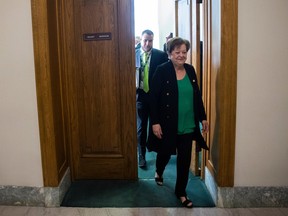For small businesses to avoid seeing their corporate income tax bill double, I think that’s going to be a big relief,” Brianna Solberg said.

Article content
The provincial government’s decision to extend the current small business tax rate at one per cent for another year is being applauded.
“Ultimately I think any affordability relief is good for small businesses with all the rising costs that they’re facing,” Brianna Solberg, Canadian Federation of Independent Business (CFIB) director of provincial affairs, said in an interview Thursday.
Advertisement 2
Article content
Article content
“Going to zero (per cent) would be great, but we’ll take a freeze at one per cent, rather than going to two per cent this year as previously planned, she added. “For small businesses to avoid seeing their corporate income tax bill double, I think that’s going to be a big relief.”
The tax rate was scheduled to increase this June, and instead will stay at one per cent until June 30, 2025. According to the province, the small business community has saved an estimated $416 million since 2020 and this continued freeze will benefit small Saskatchewan businesses with corporate income tax savings of $56 million over the year.
Minister of Finance Donna Harpauer also announced that the eligible businesses income threshold for small business tax will remain at $600,000.
Solberg said this year’s provincial budget was unsurprising, which she found interesting given the fact that it’s an election year. She appreciates that no new taxes or cost increases were announced for small businesses.
“Given that the province is now running a deficit, it was maybe a bit of a conservative budget. Ultimately, for small businesses, that they were able to pull a small win out, this is great news.”
Article content
Advertisement 3
Article content
After a difficult year for small businesses due to inflation, the aftermath of the pandemic, paying off Canadian Emergency Business Account (CEBA) loans, supply chain issues and labour shortages, Solberg is hopeful this year will be a better year.
After urging the province to adopt policies to foster a competitive taxation environment, promote policies that support sustainable economic expansion, allocate government spending to critical areas and implement measures to streamline government size and expenditures, the Saskatchewan Chamber of Commerce is also pleased by the 2024-25 budget.
A news release from the chamber said the budget introduces key initiatives and provides funding that aligns with the priorities of its members, including maintaining the small business tax rate at one per cent, incentives across critical minerals, energy, innovation and technology, the Saskatchewan Labour Market Strategy, the improvement of over 1,100 km of highways and investment in strategic transportation routes, and funding to enhance the capacity to expand and connect with international markets.
Advertisement 4
Article content
The chamber also welcomes increased investments in health care and infrastructure, and an enhanced focus on natural resources.
The budget not only acknowledges the vital role of Saskatchewan’s business community in driving economic growth, but also lays down practical steps to support it, said Prabha Ramaswamy, CEO of the Saskatchewan Chamber of Commerce, in the release.
“We are particularly pleased to see a focus on competitiveness, attracting investment, and prioritization of spending on what matters most to our business community,” Ramaswamy said.
Solberg said the budget includes good investments in economic development and is confident there will be more investments towards developing a skilled labour force.
“Those will all be really helpful for small businesses, especially given the labour challenges that many of them are facing,” she said. “We know that a shortage of skilled labour has been identified as a concern for 60 per cent of our members, so anything that will attract new and skilled employees will be great for small businesses.”
Some of the CFIB’s recommendations ahead of the budget included removing the PST on dine-in restaurant meals and on property insurance, and implementing a securing small business rebate program.
“There are some other cost initiatives that we will continue to push for that will hopefully be considered for next year’s budget when the government is back in a predicted surplus position.”
Recommended from Editorial
Article content






